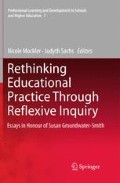Abstract
When learning is at the centre of the teaching enterprise, we would assume that the continuing professional development of teachers would be a priority of both education systems and teachers alike. Teachers like other professionals need to update their skill and knowledge base—in the case of teachers their pedagogical skills and content knowledge. In this chapter, I use three metaphors to describe current approaches to the continuing professional development of teachers: retooling, remodelling and revitalising. I add a fourth one—reimagining—to indicate the need for teachers themselves to have some agency in identifying priorities and needs for their own professional learning. My argument is that continuing professional development needs to incorporate all four of the elements of retooling, remodelling, revitalising and reimagining to have two interrelated effects: first to ensure that the goal of improving student learning is achieved and second that a strong and autonomous teaching profession is supported.
A version of this chapter was presented as a keynote address at the ICSEI conference in Slovenia 3–6 January 2007.
Access this chapter
Tax calculation will be finalised at checkout
Purchases are for personal use only
Notes
- 1.
This is a network of teachers which was established in 1999 in the Faculty of Education at the University of Sydney. Members of the Coalition go about their work examining their practices and investigating new possibilities (Groundwater-Smith and Mockler 2009).
References
Beyer, L. (2002). The politics of standardization: Teacher education in the USA. Journal of Education for Teaching, 28, 239–245.
Dadds, M. (1997). Continuing professional development: Nurturing the expert within. British Journal of Inservice Education, 23(1), 31–38.
Daley, B. (2000). Learning in professional practice. New Directions in Adult and Continuing Education, 86(Summer), 33–42.
Day, C. (1999). Developing teachers: The challenges of lifelong learning. London: Falmer.
Day, C., & Sachs, J. (2004). Professionalism, performativity and empowerment: Discourse in the politics, policies and purposes of continuing professional development. In C. Day & J. Sachs (Eds.), International handbook on the continuing professional development of teachers. Maidenhead: Open University Press.
deBono, E. (1985). Six thinking hats. Boston: Little Brown.
Groundwater-Smith, S., & Kelly, L. (2003). Seeing practice anew: Improving learning at the museum. Paper presented to the Joint AARE/NZARE Conference, Auckland.
Groundwater-Smith, S., & Mockler, N. (2003). Learning to listen: Listening to learn. Sydney: University of Sydney/MLC School.
Groundwater-Smith, S., & Mocker, N. (2009). Teacher professional learning in an age of compliance: Mind the gap. Dordrecht: Springer.
Grundy, S., & Robison, J. (2004). Teacher professional development: Themes and trends in the recent Australian experience. In C. Day & J. Sachs (Eds.), International handbook on the continuing professional development of teachers. Maidenhead: Open University Press.
Guskey, T. (1999). Apply time with wisdom. Journal of Staff Development, 20(2), 10–15. www.NSDC.org. Accessed 20 Oct 2006.
Guskey, T. (2003). What make professional development effective. Phi Delta Kappan, 84(10), 748.
Kennedy, A. (2005). Models of continuing professional development: A framework for analysis. Journal of Inservice Education, 31(2), 235–250.
Lieberman, A. (2000). Networks as learning communities: Shaping the future of teacher development. Journal of Teacher Education, 51(3), 221–227.
Little, J. W. (1994). Teachers’ professional development in a climate of educational reform, systemic reform: Perspectives on personalizing education. http://ed.gov/pubs/EdReformStudies/SysReforms/little1.html. Accessed 31 Aug 2010.
Mockler, N. (2001). Professional learning portfolios: A tool for the reflective practitioner. Paper presented at the annual conference of the Australian Association for Research in Education, Fremantle.
Mockler, N. (2005). Trans/forming teachers: New professional learning and transformative teacher professionalism. Journal of Inservice Education, 31(4), 733–746.
Morris, M., Chrispeels, J., & Burke, P. (2003). The power of two: Linking external with internal teachers’ professional development. Phi Delta Kappan, 84(10), 764.
Mujis, D., Day, C., Harris, A., & Lindsay, G. (2004). Evaluating continuing professional development: An overview. In C. Day & J. Sachs (Eds.), International handbook on the continuing professional development of teachers. Maidenhead: Open University Press.
Richardson, V. (2003). The dilemmas of professional development. Phi Delta Kappan, 84(5), 401.
Sachs, J. (2003). The activist teaching profession. Buckingham: Open University Press.
Sachs, J. (2005a). Professional standards: Quality teachers for the future. Keynote address presented at Sharing Experience: Ways Forward on Standards conference, Melbourne.
Sachs, J. (2005b). Teacher professional standards: A policy strategy to control, regulate or enhance teaching profession. In N. Bascia, A. Cumming, A. Datnow, K. Leithwood, & D. Livingston (Eds.), International handbook of educational policy. Dordrecht: Springer.
Sachs, J., & Logan, L. (1990). Control or development? A study of inservice education. Journal of Curriculum Studies, 22(5), 473–481.
Saunders, L. (2004). Evidence led professional creativity. Educational Action Research, 12(1), 163–166.
Schön, D. (1987). Educating the reflective practitioner: Toward a new design for teaching and learning in the professions. New York: Basic Books.
Sugrue, K. (2004). Rhetorics and realities of CPD across Europe. In C. Day & J. Sachs (Eds.), International handbook on the continuing professional development of teachers. Maidenhead: Open University Press.
Wenger, E. (1998). Communities of practice: Learning, meaning and identity. Cambridge: Cambridge University Press.
Author information
Authors and Affiliations
Corresponding author
Editor information
Editors and Affiliations
Rights and permissions
Copyright information
© 2011 Springer Science+Business Media B.V.
About this chapter
Cite this chapter
Sachs, J. (2011). Skilling or Emancipating? Metaphors for Continuing Teacher Professional Development. In: Mockler, N., Sachs, J. (eds) Rethinking Educational Practice Through Reflexive Inquiry. Professional Learning and Development in Schools and Higher Education, vol 7. Springer, Dordrecht. https://doi.org/10.1007/978-94-007-0805-1_11
Download citation
DOI: https://doi.org/10.1007/978-94-007-0805-1_11
Published:
Publisher Name: Springer, Dordrecht
Print ISBN: 978-94-007-0804-4
Online ISBN: 978-94-007-0805-1
eBook Packages: Humanities, Social Sciences and LawEducation (R0)

